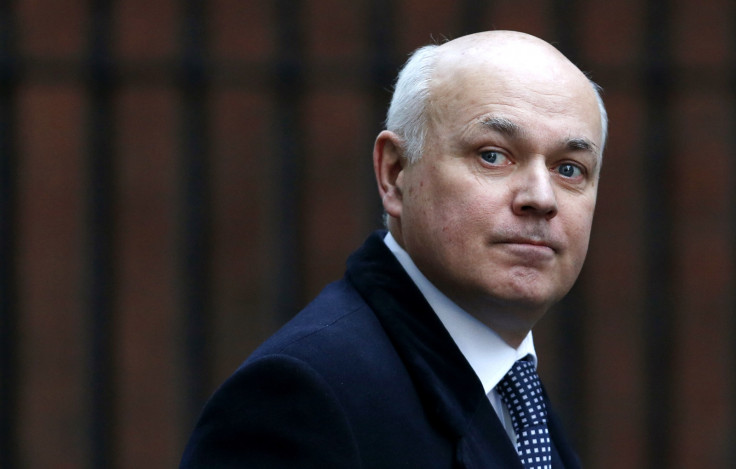Iain Duncan Smith's Universal Credit Faces 'Mini Jobs' Warning from Thinktank

The UK government's flagship welfare reform, Universal Credit, could keep benefit recipients in "mini jobs" at a higher cost to the taxpayer, according to the thinktank Resolution Foundation.
The research paper argued that although Universal Credit's work allowance - the amount you can earn while on the benefit without being taxed - can provide strong incentives to begin working part-time, families earning above the allowance may become disincentivised to work longer.
Universal Credit was introduced by the Coalition Government to replace six exiting benefits and tax credits, including Income Support and Housing Benefit, with a single monthly payment.
But the programme has been delayed and its implementation date has been pushed back by the Department for Work and Pensions from 2014 to 2017.
The Resolution Foundation was critical of the programme's work incentives.
"Marginal deduction rates remain high, with families losing two thirds or more of each extra £1 of earnings," said David Finch, author of the report and a senior economic analyst at the Resolution Foundation.
"This does not represent a significant improvement in work incentives compared to the current system and for significant numbers is, in fact, worse.
"Universal Credit will also remove the particularly large incentive in the current system to work at least 16 hours per week (24 hours for couples with children) in order to be eligible for Working Tax Credit, and the smaller step change for working 30 hours or more," said Finch.
The research also noted that the welfare reform includes no "hours rules" and offers no bonuses for full-time work.
"So, while Universal Credit makes it worthwhile for people to enter work at a smaller number of hours, it removes the current strong disincentive to work fewer than 16 hours," Finch added.
"Without some way of forcing people to increase their hours or earnings and reduce their reliance on Universal Credit, it is possible that many people on Universal Credit will remain in 'mini jobs' at higher cost to the state."
The report comes after the Labour Party said it would "pause" the welfare programme for three months if it gained power after the 2015 General Election.
Rachel Reeves, the shadow work and pensions secretary, told the BBC that she supported Universal Credit, but argued the scheme had been in "chaos" under the Coalition Government and her party would attempt to "rescue" the scheme.
"Universal Credit is already making work pay as we roll it out in a careful and controlled way and ensuring that claimants do not face the benefit cliff edge of the past," a Department for Work and Pensions spokesman said.
"Half a million working families will receive help with childcare and will be better off following the decision to increase the childcare rate from 70 per cent to 85 per cent, helping them to get more out of the money they earn.
"Under the old, inflexible system, people were reluctant to take mini-jobs and gain the valuable work experience they can provide, whereas Universal Credit adjusts as people move into employment. Our work coaches will support claimants beyond getting into work, so they can build a better paid career and take advantage of the jobs that are out there.
"Universal Credit is already available in 39 jobcentres and by Christmas will be available in 1 in 8 across Great Britain."
© Copyright IBTimes 2025. All rights reserved.






















